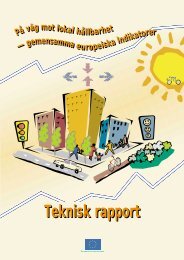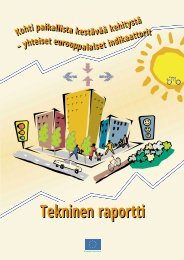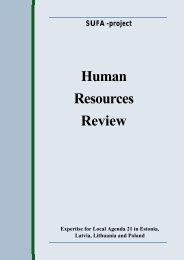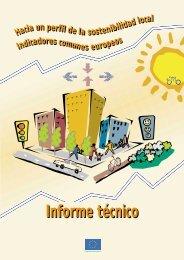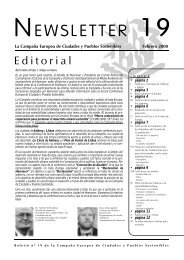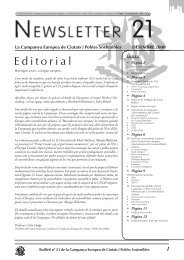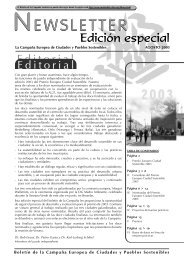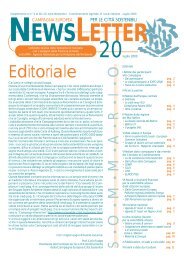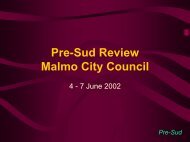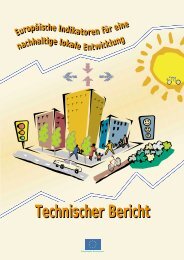the european sustainable cities and towns campaign
the european sustainable cities and towns campaign
the european sustainable cities and towns campaign
Create successful ePaper yourself
Turn your PDF publications into a flip-book with our unique Google optimized e-Paper software.
THE EUROPEAN SUSTAINABLE CITIES AND TOWNS CAMPAIGN<br />
THE EUROPEAN SUSTAINABLE CITIES AND TOWNS CAMPAIGN 2002-2003<br />
INTRODUCTION<br />
The European Sustainable Cities & Towns Campaign is<br />
entering a new phase, in which a new structure has been<br />
developed <strong>and</strong> a series of new actions will be taking place.<br />
This article provides details of <strong>the</strong> planned activities <strong>and</strong><br />
describes <strong>the</strong> structural changes that have occurred over recent<br />
months.<br />
The overall broad objective of <strong>the</strong> Campaign remains <strong>the</strong><br />
promotion of development towards sustainability through<br />
Local Agenda 21 or similar integrated planning processes <strong>and</strong><br />
<strong>the</strong> streng<strong>the</strong>ning of partnerships among all actors in <strong>the</strong> local<br />
community as well as inter-authority co-operation. This has<br />
been <strong>the</strong> Campaign’s broad purpose since its creation <strong>and</strong> this<br />
will be fur<strong>the</strong>r developed <strong>and</strong> supported during <strong>the</strong> course of<br />
<strong>the</strong> next 2 years.<br />
Achievements to date<br />
Since its launch at <strong>the</strong> end of <strong>the</strong> first European Conference on<br />
Sustainable Cities & Towns in Aalborg in 1994, <strong>the</strong> number of<br />
participants to <strong>the</strong> Campaign (i.e. signatories to <strong>the</strong> Aalborg<br />
Charter) has increased to its present number of just over 1500<br />
from 38 countries. As such, <strong>the</strong> Campaign has developed into<br />
<strong>the</strong> biggest European initiative for local <strong>sustainable</strong><br />
development <strong>and</strong> Local Agenda 21.<br />
This has been achieved through a variety of activities such as<br />
<strong>the</strong> development of sustainability guidance materials,<br />
exchange of experience, dissemination of good practice,<br />
hosting of international conferences (Aalborg, Lisbon,<br />
Hannover) <strong>and</strong> <strong>the</strong> organisation of awards. The Campaign has<br />
also played its part in influencing <strong>the</strong> development of<br />
<strong>sustainable</strong> development policy at European Union, Member<br />
State (i.e. national governments), regional <strong>and</strong> local levels.<br />
These wide-ranging activities have been possible through <strong>the</strong><br />
promotion <strong>and</strong> development of increased co-operation<br />
between networks of Local Authorities in Europe <strong>and</strong><br />
elsewhere working on <strong>sustainable</strong> urban development issues.<br />
Equally important has been <strong>the</strong> political <strong>and</strong> financial support<br />
from a number of bodies, particularly <strong>the</strong> European<br />
Commission (DG Environment) <strong>and</strong> <strong>the</strong> <strong>cities</strong> of Aalborg <strong>and</strong><br />
Hannover, without which <strong>the</strong> Campaign activities could not<br />
have been sustained.<br />
80<br />
174<br />
Campaign Pa r t i c i p a n t s<br />
305<br />
383<br />
THE NEW STRUCTURE OF THE CAMPAIGN<br />
During <strong>the</strong> Campaign period 1994-2000, <strong>the</strong> basic Campaign<br />
structure revolved around a co-ordination committee (CoCom)<br />
consisting of 5 local authority networks (ICLEI, CEMR,<br />
EUROCITIES, UTO, <strong>and</strong> WHO – Healthy <strong>cities</strong>), plus <strong>the</strong> <strong>cities</strong><br />
of Aalborg <strong>and</strong> Hannover. DG Environment <strong>and</strong> <strong>the</strong> EU Expert<br />
Group on <strong>the</strong> Urban Environment, both with observer status,<br />
also participated in <strong>the</strong> CoCom.<br />
During <strong>the</strong> past 18 months, <strong>the</strong> Campaign has undertaken a<br />
review of its structure. A mapping exercise of local authority<br />
networks was undertaken <strong>and</strong> a dialogue process initiated with<br />
a number of additional local authority networks <strong>and</strong> o<strong>the</strong>r<br />
organisations with an interest in <strong>sustainable</strong> development at<br />
446<br />
627<br />
880<br />
1521<br />
1350<br />
1994 1995 1996 1997 1998 1999 2000 2001 2002<br />
<strong>the</strong> local level. As a consequence of this, a new Campaign<br />
structure has been developed.<br />
This new structure is based on a Steering Committee<br />
comprising of 10 networks of local authorities <strong>and</strong> a Political<br />
Board comprising of local political representatives nominated<br />
by <strong>the</strong> 10 networks. The Campaign’s co-funders also sit on<br />
both <strong>the</strong> Steering Committee <strong>and</strong> <strong>the</strong> Political Board, as does<br />
<strong>the</strong> EU Expert Group on <strong>the</strong> Urban Environment (observer<br />
status).<br />
The 10 networks that sit on <strong>the</strong> Steering Committee are <strong>the</strong><br />
original five CoCom members, plus <strong>the</strong> Association of Cities<br />
<strong>and</strong> Regions for Recycling (ACRR), Climate Alliance, Energie-<br />
Cités, Medcités, <strong>and</strong> <strong>the</strong> Union of <strong>the</strong> Baltic Cities (UBC). The<br />
Steering Committee is <strong>the</strong> principal body for <strong>the</strong> achievement<br />
of <strong>the</strong> Campaign’s objectives, being responsible for <strong>the</strong> overall<br />
management <strong>and</strong> development of <strong>the</strong> Campaign. A brief<br />
introduction to all 10 networks within <strong>the</strong> Campaign’s Steering<br />
Committee is provided on <strong>the</strong> following pages.<br />
The Political Board is presently being developed <strong>and</strong> details of<br />
<strong>the</strong> board <strong>and</strong> its remit will be made available in <strong>the</strong> near<br />
future.<br />
The organisation of <strong>the</strong> Steering Committee <strong>and</strong> Political<br />
Board, as well as <strong>the</strong> overall co-ordination of <strong>the</strong> Campaign is<br />
facilitated through a Campaign Office based in Brussels.<br />
ACTIVITIES OF THE CAMPAIGN – 2002-03<br />
Within <strong>the</strong> framework described above, a proposal for<br />
Campaign activities for <strong>the</strong> period 2001-2003 was developed<br />
last year. This proposal was submitted by EUROCITIES on<br />
behalf of all Campaign partners to <strong>the</strong> European Commission<br />
(DG Environment) within <strong>the</strong> framework of <strong>the</strong> Community<br />
Framework for Co-operation to promote Sustainable Urban<br />
Development. The proposal was supported with co-funding<br />
from L<strong>and</strong>eshauptstadt Hannover, Germany; Ajuntament y<br />
Diputació de Barcelona, Spain; Malmö Stad, Sweden <strong>and</strong><br />
Coordinamento Italiano Agende 21 Locali, Italy.<br />
The project proposal was successful. The content of that<br />
proposal will now form <strong>the</strong> basis for <strong>the</strong> Campaign’s<br />
forthcoming 2-year work programme, which can be split into 4<br />
broad categories:<br />
Co-operation <strong>and</strong> Co-ordination Activities<br />
A series of meetings of <strong>the</strong> Campaign’s Steering Committee <strong>and</strong><br />
Political Board will be held during <strong>the</strong> course of <strong>the</strong> next 2<br />
years as a means to promote co-operation <strong>and</strong> ensure coordination<br />
of activities. The Campaign office will be<br />
responsible for <strong>the</strong> organisation of <strong>the</strong>se meetings.<br />
Co-operation <strong>and</strong> co-ordination will also be achieved through<br />
a variety of information <strong>and</strong> dissemination mechanisms, such<br />
as <strong>the</strong> publication of <strong>the</strong> Campaign newsletter, <strong>the</strong> continual<br />
development of <strong>the</strong> Campaign webpage <strong>and</strong> <strong>the</strong> monthly<br />
emailing service. All such activities are undertaken through <strong>the</strong><br />
Campaign Office.<br />
Thematic Working Sessions on Urban Sustainable<br />
Development<br />
Each of <strong>the</strong> Campaign partners has a wealth of experience <strong>and</strong><br />
information at <strong>the</strong>ir disposal. To maximise this available<br />
knowledge, a series of six Thematic Working Sessions will be<br />
held during <strong>the</strong> period 2001-03. Each session will focus on<br />
cross cutting issues reflecting many of <strong>the</strong> key policy<br />
developments at <strong>the</strong> European level <strong>and</strong> in particular some of<br />
<strong>the</strong> key topics of <strong>the</strong> 6 th Environmental Programme. Each of <strong>the</strong><br />
sessions will be led by one or two of <strong>the</strong> Campaign networks<br />
<strong>and</strong> are based around <strong>the</strong> following topics:<br />
Evaluation: led by ICLEI – March 2002<br />
Environmental Governance:<br />
led by EUROCITIES/UBC – October 2002<br />
Climate Change:<br />
led by Energy Cités/Climate Alliance – November 2002<br />
Social Aspects of Sustainable Development:<br />
led by WHO – date to be confirmed (tbc)<br />
The European Sustainable Cities & Towns Campaign



